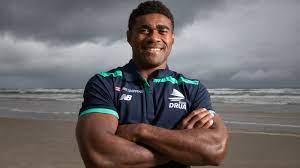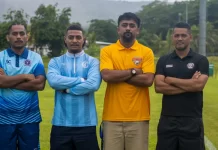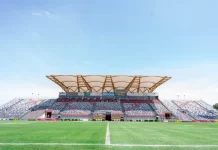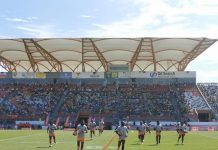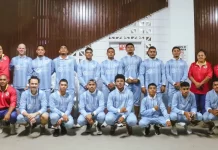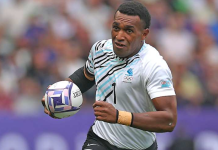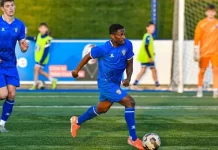Drua winger Vinaya Habosi defied doctors’ orders and a blood infection that nearly killed him to become one of the breakout stars of Super Rugby Pacific.
At just 22, Habosi’s speed and tough playing style has him topping the competition for defenders beaten, and in the top four for clean breaks and carry metres. He’s scored two tries for the Super Rugby newcomers and started every game for them, all in his first season of professional rugby. Wallabies great Tim Horan called him “the find of 2022”.
But eight months ago, Habosi was on his death bed in a Christchurch hospital, his career over before it had started, struck down by an infection that Flying Fijian team officials had initially explained away as a groin strain.
The pulsating pain down his right leg, so severe it rendered him immobile, was in fact a mystery infection. Left any longer, doctors later told him, it would have entered his bone and led to paralysis or possibly death.
Habosi was on tour with the Fiji Test side in New Zealand, desperate to impress selectors. The Drua were nothing more than a rumour at this point so Test selection was his only chance to be noticed by overseas scouts or the Fiji Sevens side. As pain bloomed in his groin, Habosi’s audition turned into a nightmare.
“After training I told the physio my groin was painful, a pulsating pain in my right leg,” he recalled. “I had an injection before we headed to dinner but when we came back I told them it was still really sore, and they gave me a painkiller. I went to my room but couldn’t sleep with the pain.
“In the morning my roommate Simi Kuruvoli was asleep but I woke him up and told him it was getting worse. I was crying out in agony, I couldn’t hold the pain, so we called the physio to come to the room.”
The physio called the team doctor. After one look at Habosi, sweating on the hotel room floor, unable to move from a seated position, the doctor called an ambulance. Hospital staff treated the infection with antibiotics over a two-week stay in hospital. They told the young winger he was lucky to be alive and would not be strong enough to train for six months.
“They said it went well for me because my heart was fresh and strong,” Habosi said. “The doctors came in and told me, ‘You were so lucky’. I didn’t cry that day, I was just sitting and staring at them, thinking what might have happened. They said, ‘This sickness could have made you immobile, or killed you’. It could have taken my life.”
Habosi spent two weeks with family in Christchurch after being discharged from hospital. He had lost 20 kilograms and all conditioning. Fired inside by self-belief and determination, he set about proving his doctors wrong, starting light gym work during that period.
Then, during quarantine at home in Fiji, a message from Fiji Rugby Union high-performance boss Simon Raiwalui solidified his resolve.
“Simon asked if I wanted to join the Drua, I was very happy,” Habosi said. It was August and the team were assembling in September, with pre-season starting in Australia in October. Two months to bridge a gap the doctors said would take six. The grind began.
Habosi quit his job as a firefighter in Suva and moved back to his village, Nayawa, in the hilly Nadroga province. At the start he would run 100 metres and walk one kilometre every four days, playing touch rugby in between. His stamina came back.
“There’s a place near our village that goes up the mountain and I would run there and come back,” Habosi said. “It took me one month to get into the gym again, I started with 40, 50kgs on bench press. I was just pushing myself, saying to myself, ‘six months, I can say no to these six months’.”
Drua coach Mick Byrne was impressed with the young and hungry winger who presented at Lennox Head in September. Habosi worked hard and showed enough to win a spot in the Drua’s first starting side in Super Rugby. He has kept the spot and played 80 minutes every week with a power and toughness not even a brush with death could dilute.
“There’s lots of things to like about Habosi. The big one is his attitude to the game. He carries the ball like he wants to break tackles. He carries the ball like he wants to make the gain line. He carries the ball with purpose,” Byrne said.
“He’s fit and fast and strong, just like you like your wingers. At this stage he’s learning every week and getting better every week. He’s enjoying himself and I’d just like to keep him improving every week.
SOURCE: SMH/PACNEWS






